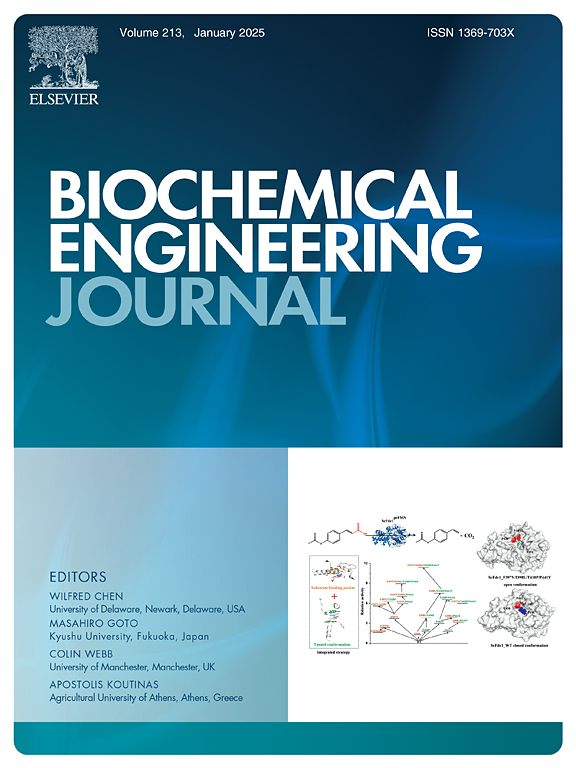Enhancing thermophilic composting through key thermophilic fungi: A microbial succession study
IF 3.7
3区 生物学
Q2 BIOTECHNOLOGY & APPLIED MICROBIOLOGY
引用次数: 0
Abstract
Thermophilic microorganisms offer a favorable solution to accelerate thermophilic composting; however, the details of the microbial community responsible for compost production have only emerged recently. In this study, we reported a detailed study of fungal succession during thermophilic composting and identified key thermophilic fungi capable of enhancing the biological process of compost humification. Through high-throughput sequencing, a total of 238 fungal species were identified with β-diversity of the fungal community significantly changing during the thermophilic phase and then maintained a relatively stable composition. The Class of Eurotiomycetes played an important role in the Thermophilic and Maturation process and became the center of fungal community network. Functional prediction revealed that fungal groups with cellulose/xylan-degrading activities were significantly more abundant during the thermophilic phase compared to the initial stage. Subsequently, a total of 16 fungi were isolated in situ, and their phylogeny and degradation capabilities were determined. Two fungal strains were reintroduced into the compost, resulting in a shortened composting time from 5 days to 3 days, an improved germination index, and enhanced compost quality, particularly promoting wheat growth. The findings of this study contribute to the development of fungal inocula for accelerating composting and providing new strategies for the efficient utilization of agricultural waste. This research holds significant importance for the increasing utilization of agricultural waste.
通过关键的嗜热真菌增强嗜热堆肥:微生物演替研究
嗜热微生物为加速嗜热堆肥提供了有利的解决方案;然而,负责堆肥生产的微生物群落的细节直到最近才出现。在这项研究中,我们详细研究了嗜热堆肥过程中真菌的演替,并确定了能够促进堆肥腐殖质化生物过程的关键嗜热真菌。通过高通量测序,共鉴定出238种真菌,真菌群落的β-多样性在嗜热期发生显著变化,然后保持相对稳定的组成。eurotiomyctes类在嗜热和成熟过程中起着重要作用,成为真菌群落网络的中心。功能预测显示,与初始阶段相比,在嗜热阶段具有纤维素/木聚糖降解活性的真菌群明显丰富。随后,共原位分离了16种真菌,并确定了它们的系统发育和降解能力。将两株真菌重新引入堆肥中,堆肥时间从5天缩短到3天,萌发指数提高,堆肥质量提高,特别是促进小麦生长。本研究结果有助于开发真菌接种剂加速堆肥,为农业废弃物的高效利用提供新策略。本研究对提高农业废弃物的资源化利用具有重要意义。
本文章由计算机程序翻译,如有差异,请以英文原文为准。
求助全文
约1分钟内获得全文
求助全文
来源期刊

Biochemical Engineering Journal
工程技术-工程:化工
CiteScore
7.10
自引率
5.10%
发文量
380
审稿时长
34 days
期刊介绍:
The Biochemical Engineering Journal aims to promote progress in the crucial chemical engineering aspects of the development of biological processes associated with everything from raw materials preparation to product recovery relevant to industries as diverse as medical/healthcare, industrial biotechnology, and environmental biotechnology.
The Journal welcomes full length original research papers, short communications, and review papers* in the following research fields:
Biocatalysis (enzyme or microbial) and biotransformations, including immobilized biocatalyst preparation and kinetics
Biosensors and Biodevices including biofabrication and novel fuel cell development
Bioseparations including scale-up and protein refolding/renaturation
Environmental Bioengineering including bioconversion, bioremediation, and microbial fuel cells
Bioreactor Systems including characterization, optimization and scale-up
Bioresources and Biorefinery Engineering including biomass conversion, biofuels, bioenergy, and optimization
Industrial Biotechnology including specialty chemicals, platform chemicals and neutraceuticals
Biomaterials and Tissue Engineering including bioartificial organs, cell encapsulation, and controlled release
Cell Culture Engineering (plant, animal or insect cells) including viral vectors, monoclonal antibodies, recombinant proteins, vaccines, and secondary metabolites
Cell Therapies and Stem Cells including pluripotent, mesenchymal and hematopoietic stem cells; immunotherapies; tissue-specific differentiation; and cryopreservation
Metabolic Engineering, Systems and Synthetic Biology including OMICS, bioinformatics, in silico biology, and metabolic flux analysis
Protein Engineering including enzyme engineering and directed evolution.
 求助内容:
求助内容: 应助结果提醒方式:
应助结果提醒方式:


